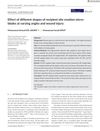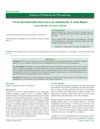 2 citations,
January 2014 in “Hair therapy & transplantation”
2 citations,
January 2014 in “Hair therapy & transplantation” New treatments for hair growth disorders are needed due to limited current options and complex hair follicle biology.
 2 citations,
July 2013 in “Veterinary dermatology”
2 citations,
July 2013 in “Veterinary dermatology” Dog skin with hair loss, when transplanted to mice, regrew hair, suggesting the hair loss cause is likely body-wide, not skin-specific.
 2 citations,
March 2014 in “Turkderm”
2 citations,
March 2014 in “Turkderm” Mesotherapy and platelet-rich plasma treatments may help with hair loss, but their safety and effectiveness are still uncertain.
 1 citations,
August 2021 in “Dermatologic Surgery”
1 citations,
August 2021 in “Dermatologic Surgery” Robotic systems in hair transplant surgery are safe, reliable, and as efficient as manual methods, with high patient satisfaction.
 1 citations,
June 2021 in “Journal of dermatology and dermatitis”
1 citations,
June 2021 in “Journal of dermatology and dermatitis” Tyrosine kinase inhibitors show promise in treating some skin diseases but their definitive role in dermatology is still unclear.
 1 citations,
February 2021 in “Journal of Cosmetic Dermatology”
1 citations,
February 2021 in “Journal of Cosmetic Dermatology” Using a 30°-sapphire blade at a lower angle causes the least injury in hair transplants.
1 citations,
August 2019 in “Chinese Medical Journal” A man developed facial skin lesions after a stem cell transplant, which improved with specific treatments.
 1 citations,
July 2018 in “Elsevier eBooks”
1 citations,
July 2018 in “Elsevier eBooks” Triple horizontal scalp biopsies are 98% accurate in diagnosing hair loss, better than single biopsies.
 1 citations,
May 2017 in “InTech eBooks”
1 citations,
May 2017 in “InTech eBooks” The document explains the causes, types, diagnosis, and treatments of hair loss, and its psychological impact, especially on women.
 1 citations,
February 2017 in “Journal of Aesthetic Nursing”
1 citations,
February 2017 in “Journal of Aesthetic Nursing” Men are getting more beard transplants to look better and follow fashion trends.
 1 citations,
August 2013 in “Springer eBooks”
1 citations,
August 2013 in “Springer eBooks” Birth control pills and anti-androgen medications help manage hair growth, acne, and hair loss in women with PCOS.
 1 citations,
January 2013 in “Elsevier eBooks”
1 citations,
January 2013 in “Elsevier eBooks” The document reviews various hair and nail disorders, their causes, and treatments, emphasizing the need for proper diagnosis and the link between nail changes and systemic diseases.
 1 citations,
December 2010 in “InnovAiT”
1 citations,
December 2010 in “InnovAiT” The document concludes that accurate diagnosis and appropriate management are crucial for treating various hair disorders, which have significant psychological impacts.
 1 citations,
January 1967 in “The BMJ”
1 citations,
January 1967 in “The BMJ” The document concludes that while some hair and scalp disorders can be treated, hair loss from destroyed follicles is permanent, and damaged hair can only regrow naturally.
 1 citations,
April 2020 in “Plastic and Aesthetic Nursing”
1 citations,
April 2020 in “Plastic and Aesthetic Nursing” PRP therapy might help increase hair growth for nonscarring alopecia, but more research is needed to confirm its effectiveness.
 September 2023 in “Frontiers in medicine”
September 2023 in “Frontiers in medicine” The mTOR signaling pathway is crucial for hair health and targeting it may lead to new hair loss treatments.
 June 2023 in “Buletin de psihiatrie integrativă”
June 2023 in “Buletin de psihiatrie integrativă” Alopecia causes significant emotional distress and psychological issues, requiring combined skin and mental health treatment.
 July 2022 in “Plastic surgery and modern techniques”
July 2022 in “Plastic surgery and modern techniques” Using stem cell-enriched fat injections before hair transplant surgery can result in less hair loss and thicker hair.
 June 2020 in “Applied sciences”
June 2020 in “Applied sciences” A new semi-automatic hair implanter could make hair transplants easier, more successful, and more accessible.
 February 2020 in “Scholars international journal of traditional and complementary medicine”
February 2020 in “Scholars international journal of traditional and complementary medicine” Ayurveda treats hair problems like hair loss and dandruff by balancing body elements and using natural remedies like Indian Gooseberry and false Daisy.
 December 2019 in “Journal of pediatrics & neonatology”
December 2019 in “Journal of pediatrics & neonatology” A 13-year-old boy had a rare, stable type of hair loss with little chance of regrowth, but treatment is available for looks.
 January 2019 in “Georg Thieme Verlag eBooks”
January 2019 in “Georg Thieme Verlag eBooks” Platelet-Rich Plasma (PRP) therapy can effectively treat various hair loss conditions, improve hair count, thickness, and density, and potentially speed up results when combined with surgical techniques.
 September 2018 in “Facial Plastic Surgery Clinics of North America”
September 2018 in “Facial Plastic Surgery Clinics of North America” Biologicals are increasingly used in medicine and cosmetics, especially for skin and hair treatments, but more research is needed.
 March 2018 in “Suez Canal University Medical Journal”
March 2018 in “Suez Canal University Medical Journal” New drugs targeting the JAK-STAT pathway show promise for treating inflammatory skin diseases.
 January 2018 in “Elsevier eBooks”
January 2018 in “Elsevier eBooks” The document concludes that alopecia has significant social and psychological effects, leading to a market for hair loss treatments.
 January 2018 in “Elsevier eBooks”
January 2018 in “Elsevier eBooks” The document concludes that alopecia has various forms, each with specific treatments, but no definitive cure for certain types like CCCA has been proven.

Hair transplant surgery can have complications.
 November 2016 in “Hair transplant forum international”
November 2016 in “Hair transplant forum international” Hair transplant surgery should only be done by licensed professionals, as many states don't allow unlicensed personnel to perform it.
 January 2016 in “Springer eBooks”
January 2016 in “Springer eBooks” The document concludes that there are various causes and treatments for hair loss, with hair transplantation being a notable option.
 January 2016 in “Chemistry & Industry”
January 2016 in “Chemistry & Industry” Two drugs, tofacitinib and ruxolitinib, may help regrow hair by activating hair follicles.





























